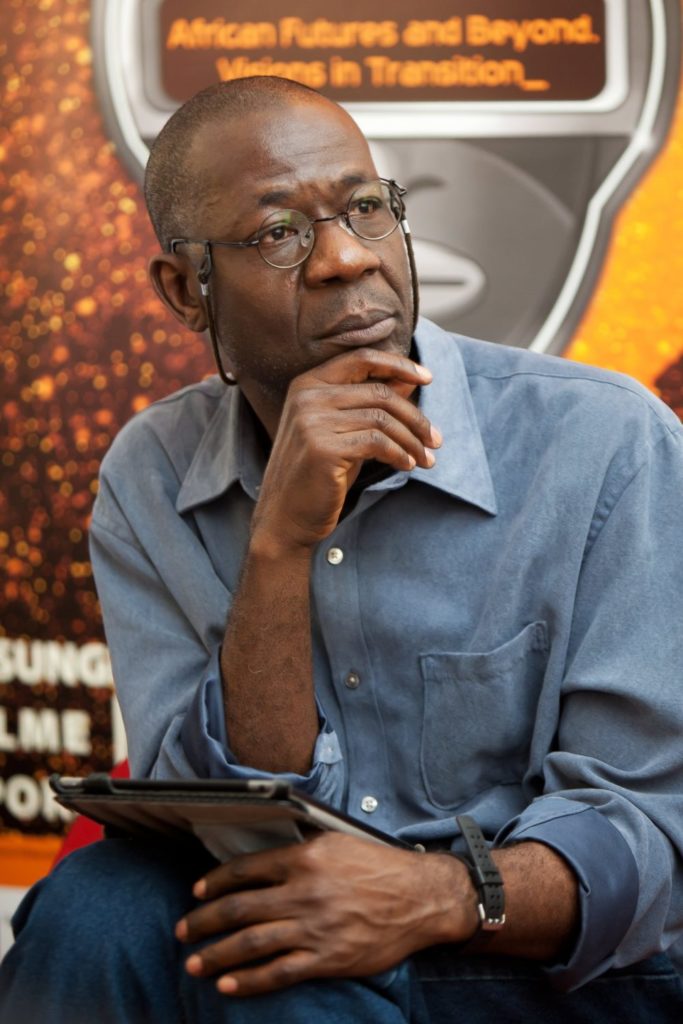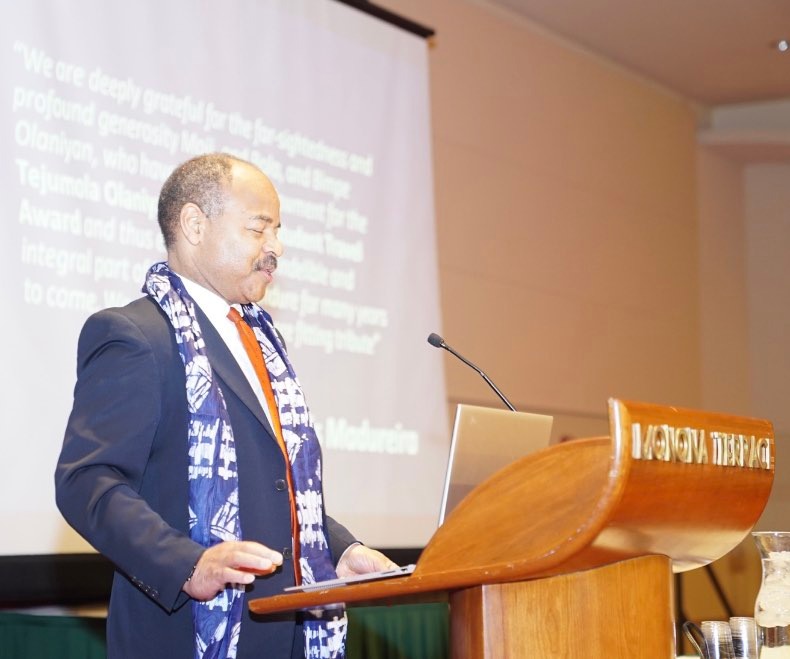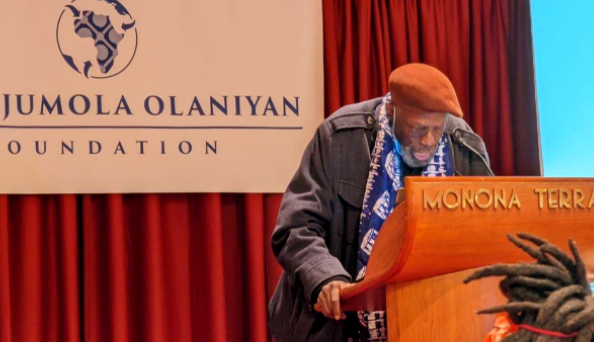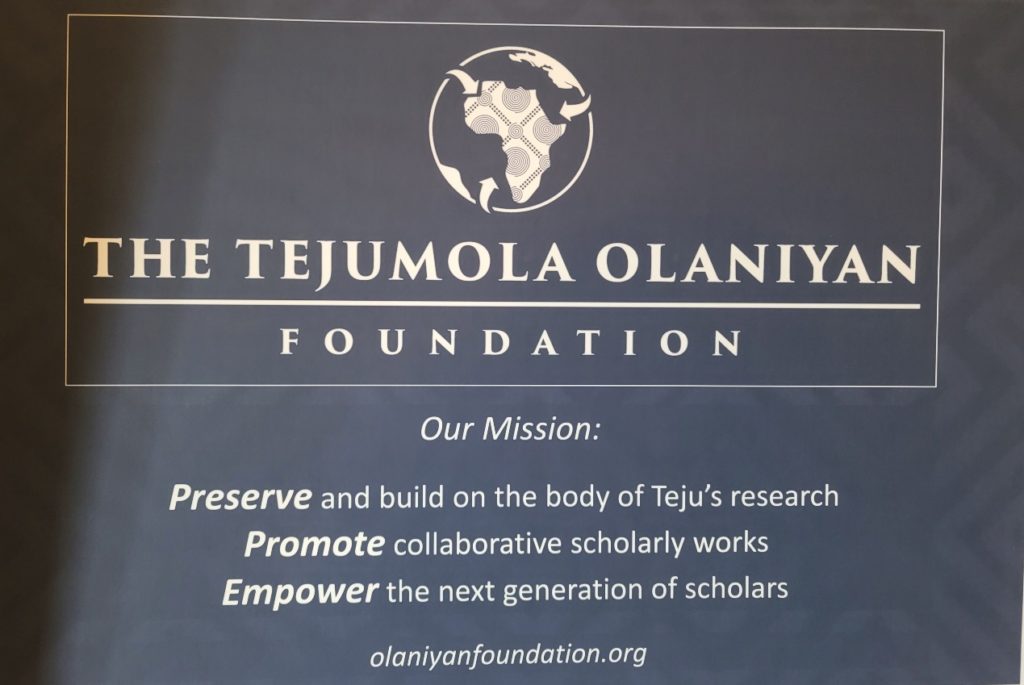
The family of the late Teju Olaniyan, a beloved UW-Madison professor who died suddenly on Nov. 30, 2019, honored his legacy with a celebration of his life on April 9 at the Monona Terrace Community and Convention Center, and launched a nonprofit in his name that will focus on preserving and continuing strands of his contributions to higher education.
Tejumola (Teju) Olaniyan was the Louise Durham Mead Professor of English & Wole Soyinka Professor of the Humanities at the University of Wisconsin-Madison. He also served as the Senior Fellow and Interim Director at the Institute for the Humanities during his 18 years at the University of Wisconsin-Madison. He was 60 years old when he passed away in late 2019.

The COVID-19 pandemic had previously prevented a large, in-person celebration of Olaniyan’s life until this past weekend when his immediate family (wife, Moji, and daughters, Bola and Bimpe) and his greater academic family hosted an extensive three-part celebration program.
The family also used this opportunity to launch the Tejumola Olaniyan Foundation, a non-profit/tax-exempt organization to honor Teju’s legacy.
Olaniyan was an internationally-recognized scholar of African, African American, and Caribbean literatures, post-colonial studies, genre studies and popular culture studies, whose distinguished body of work serves as a foundation for other scholars around the world in African and Diasporic studies. Olaniyan’s academic homes at UW–Madison included the departments of English and African Cultural Studies.
His Celebration of Life opened with two, four-person UW-Madison faculty panel discussions focusing on the works of Olaniyan, books that he published, articles that he published, and different aspects of his scholarship.

“There were a lot of people who came from out of state for this event. There are also faculty from Cornell, from Harvard and everywhere that he had friends that worked with him during his professional life,” Moji Olaniyan, Teju Olaniyan’s wife, tells Madison365.
Eric Wilcots, dean of the UW-Madison College of Letters and Science, made the welcoming address at lunch. The keynote address was provided by Biodun Jeyifo, professor of African and African American Studies and of Comparative Literature at Harvard University. Jeyifo was a longtime friend and colleague of Olaniyan.

An evening reception was later held at the Madison Senior Center.
“Teju was a pioneer in this area of studies now called Global Black Cultural Studies,” Moji Olaniyan says. “When he graduated from Cornell, his dissertation, which would turn into his first book, actually focused on African American, African, and Caribbean experiences and how the writers of fiction actually had common themes based on the cultural aspect of colonialism. He has been a proponent of looking at Blackness across the diaspora, whether it’s in Cuba, the Caribbean or anywhere else that Black people show up that is something very worthy of research around Black Cultural Studies.”
The essays, interviews, and cartoons presented in Olaniyan’s ‘Taking African Cartoons Seriously: Politics, Satire, and Culture’ vividly demonstrate the rich diversity of cartooning across Africa and highlight issues facing its cartoonists today, such as sociopolitical trends, censorship, and use of new technologies.
“He has an extensive research base in African music and African architecture and he’s written about the African state … that’s when he first got the idea to write about the African political cartoons,” Moji Olaniyan remembers.
Olaniyan published the monograph “Arrest the Music! Fela and His Rebel Art and Politics,” a masterful interdisciplinary study of modern African popular music. “It’s an award-winning book on the Nigerian musician. It really attracted a lot of scholars, students and non-scholars,” Moji says. “He had a vision and people caught on to it across academia all over the world. He has published books with people from different areas like theater, English, cultural studies, music, architecture and cartoon.”
The Tejumola Olaniyan Foundation is a tax-exempt nonprofit whose vision involves providing resources for hosting and disseminating new and noteworthy initiatives towards the advancement of its mission in the work on Global Black Cultural Studies.
”Right now, the foundation is raising money to figure out what we can do with his collection of books,” Moji Olaniyan says. “There are 5,000 books in the area of global cultural studies in his personal collection that I want us to keep together. He founded an encyclopedia of African political cartoons that a lot of people now use for their research, and a lot of graduate students study as something that they want to specialize in.”
Moji Olaniyan says her husband was a very quiet and personal person, but also a very funny man.
“He was private. So if he were here, he would just say ‘What’s all the fuss about?’” Moji laughs. “He never called attention to himself. And some of his friends have reminded me of that, too. But I would always say to him, ‘I will celebrate you the way I think you deserve to be celebrated.’
“Teju’s life could be summed up in this proverb. ‘If you want to go fast, go alone. If you want to go far, go together.’ And he dedicated his life to giving people a helping hand,” she adds. “A lot of his professional colleagues and students are still kind of stunned.”
The Tejumola Olaniyan Foundation wants to not only remember and bring awareness to the body of work of Teju but, more importantly, to build upon Olaniyan’s vision of Black Cultural Studies and the nurturing of the next generation.
“Teju would talk about the fact that we should encourage the next generation of scholars. We should nurture them. The three words that we use to describe the foundation are preserve, promote, and empower,” Moji Olaniyan says. “We want to preserve and build upon the foundational work. We want to promote scholarly work that’s going on right now across the universities, especially the UW. And we want to empower the many graduate students that we know, which is quite a few – Teju and I had been here for 20 years.”



